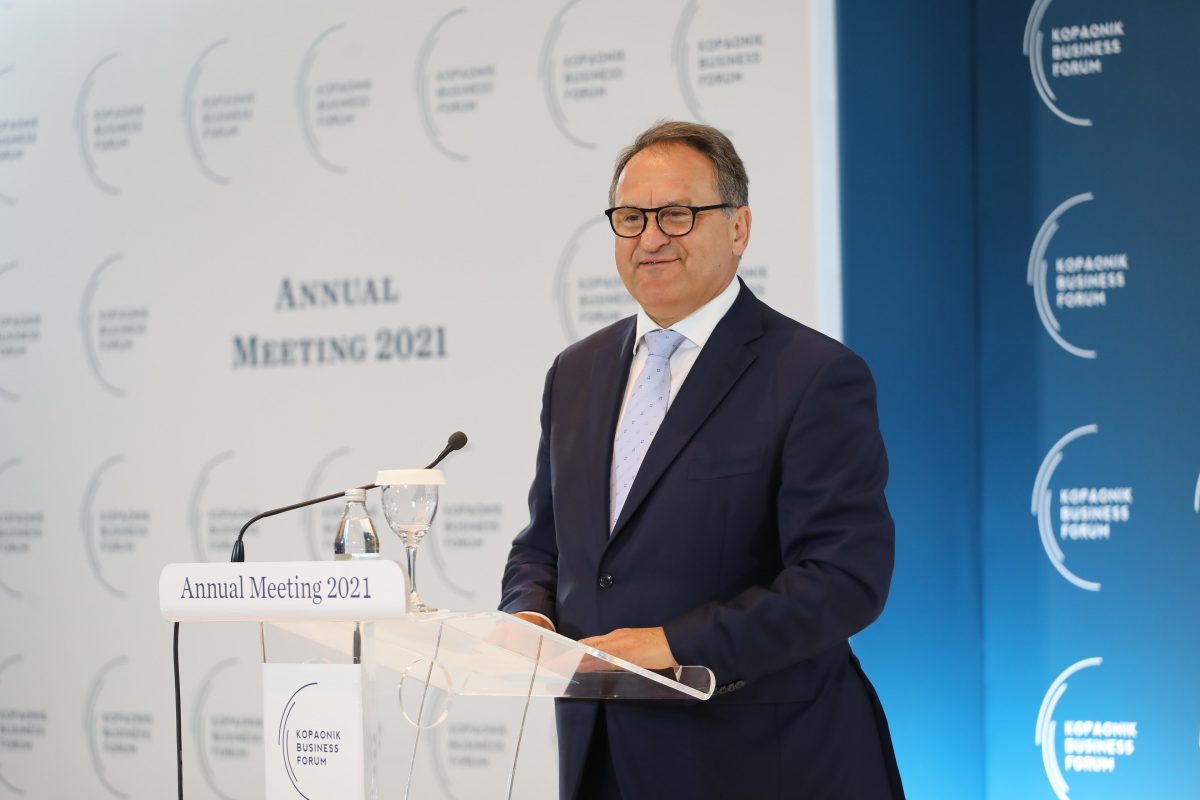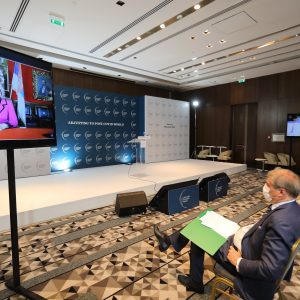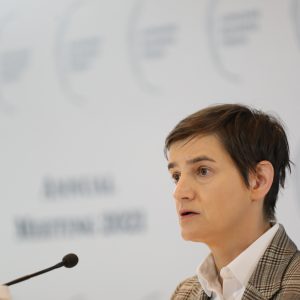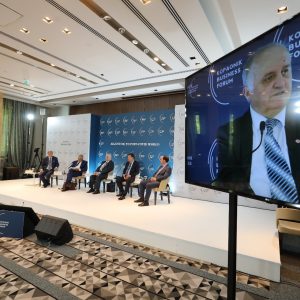“Despite the Covid-19-induced pandemic, the 28th Kopaonik Business Forum was successfully held and once again proved to be the most important regional conference, which talks not only about strictly economic issues but about much broader topics related to the long-term development of society,” Aleksandar Vlahović, President of the Serbian Association of Economists, said after the Forum, also known as ‘The Serbian Davos’, finished.

In a changed format, at a different time and, this time in Belgrade instead of on the Kopaonik Mountain, the Forum was held from May 24 to 27, and its main theme was “The world after Covid-19 – new sources of growth in changed business conditions”. In a live broadcast via the Youtube platform, the Forum was watched by approximately 4,000 viewers. More than 130 panellists, about 50 accredited journalists, as well as close to a hundred participants gathered in the main hall of the Metropol Palace Hotel in Belgrade, to have interesting discussions over the course of four days.
“The world-renowned expert and university professor, Branko Milanović, was the special guest of the 28th Kopaonik Business Forum, who spoke about the phenomenon of global inequality and, especially, the impact of Covid-19 on the world economy. Traditionally, the Kopaonik Business Forum was officially closed by the Prime Minister of the Republic of Serbia, Ana Brnabić, who gave a closing address,“ said Aleksandar Vlahović, adding that the conclusions of certain panels will be useful to the creators of economic policy in our country.
The Prime Minister of the Republic of Serbia, Ana Brnabić, closed the 28th Kopaonik Business Forum with her presentation. In her address to the participants of this year’s Forum, she congratulated on the successful organization of the Kopaonik Business Forum in the new format.
„Today, Serbia is no longer spoken about as a land of the cheap workforce. Companies cooperate with us because of our knowledge, creativity and excellence. Digitalization has come to life in Serbia and is gradually making the economy more competitive and the state administration more efficient. At the end of 2020, the Serbian economy recorded a minimal GDP decline, while the growth in the first quarter promises that we will exceed the projected growth of 6%,“ said the Prime Minister, adding that the growth was driven by the growing construction industry and infrastructure development.
Ana Brnabić also spoke about the importance of the combination of biotechnology and technology and said that the export of ICT services in March increased by as much as 25% relative to March last year, that many opportunities lie ahead, and that green and biotechnological transformation will be greater than the digital one.
After the official opening, Jorgovanka Tabaković, the Governor of the National Bank of Serbia, addressed the participants of this year’s Kopaonik Business Forum via a video message, talking about how the crisis caused by the coronavirus pandemic was dealt with, what was done and what is ahead of us. “We faced the crisis more prepared and more resilient. Before the crisis, we used our potential, and our task during the crisis was to provide assistance to businesses and stimulate domestic demand,” Governor Tabaković said. Speaking about credit activity, she said that it remained stable for private sector financing and that the structure of credit growth remained favourable this year as well.
Digitalization has come to life in Serbia and is gradually making the economy more competitive and the state administration more efficient
On the first day of the Kopaonik Business Forum, Serbian Minister of Finance Siniša Mali, also had his presentation. He began by talking about the successes that the state and the citizens of Serbia have achieved in the fight against Covid-19. He pointed out that Serbia ranks 4th in Europe in terms of the number of revaccinated citizens. Mr Mali also underlined that all European ministers have found ways to accelerate the growth of their respective countries and added that the results from last year show that, Serbia ranks among the 3 countries in Europe with the smallest decline in GDP in 2020, excluding Ireland and Turkey. The Finance Minister predicted growth this year too, saying that GDP growth in 2021 will be closer to 7% than 6% and that in the next four years, we will be moving towards an average salary of 900 euro.
Zorana Mihajlović, Deputy Prime Minister of the Republic of Serbia and Minister of Mining and Energy, participated in a panel dedicated to green and sustainable recovery. At the beginning of the panel, she said that the issue of energy transition and the green answer cannot wait.
„The state has changed certain energy and mining laws and passed new ones, which are the basis for what we are planning to do,“ said Zorana Mihajlović, adding that Serbia has the Law on Renewable Sources for the first time ever, which is the basis for producing electricity from renewable energy sources. Speaking about energy efficiency, she said that the goal is to increase energy efficiency and that we currently consume 40% more energy than EU countries. She also pointed out that it is important to draft an investment plan, which will show Serbia’s future direction and the way it will achieve higher energy efficiency. Minister Mihajlović added that a new energy strategy is being written and that we must support the development of the energy sector and environmental protection.
This year’s ‘Serbian Davos’ was an interactive platform for the exchange of opinions and well-argued and constructive discussions
Sem Fabrizi, the head of the Delegation of the European Union to Serbia, congratulated Minister Mihajlović on her decisive activities and added that Serbia is on the right track.
„Energy efficiency and renewables are key. Serbia has a regional approach and is increasingly linked to the green agreement. The government’s activities in the gas sector are good, and Serbia is taking sound steps in that direction,“ said Sem Fabrizi. He added that the EU has long advocated control of carbon emissions and it wants to reduce the emissions to zero by 2050.
The third day of the Kopaonik Business Forum began with speeches by plenary speakers Darija Kisić Tepavčević, Minister of Labour, Employment, Veteran and Social Affairs, and Marija Obradović, Minister of Public Administration and Local Self-Government.
During the Forum, a number of panels were dedicated to economic and social development in the post-pandemic period. A novelty in relation to all previous forums is that the health panel was held at the beginning of the Forum in order to highlight the importance of this aspect in the fight against the pandemic, but also to present the health situation in Serbia during the pandemic, scientific progress in health care and its contribution to the improvement of personalized medicine in Serbia.
The Kopaonik Business Forum is organized by the Serbian Association of Economists in partnership with Mastercard. This year’s ‘Serbian Davos’ was an interactive platform for the exchange of opinions and well-argued and constructive discussions, with the consideration of key economic, health and social challenges in the period during and after the coronavirus pandemic. This year, the Forum gathered the most important state officials, representatives of international financial institutions, members of the diplomatic corps, presidents of regional chambers of commerce, the most important executives from the real and financial sector and numerous successful entrepreneurs.


